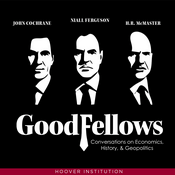1081 episódios
- AI can make mistakes – and AI chatbots like ChatGPT warn you about that whenever you ask them anything.
These mistakes sometimes involve making up entirely fictitious, factually false statements known as “hallucinations”.
Whether these hallucinations matter depends on what you’re using AI for, and whether they are spotted and corrected.
The team on More or Less were slightly surprised to read a headline in Fortune magazine, claiming that a top academic AI conference accepted research papers which contained 100 AI-hallucinated citations.
You might think that the top AI researchers in the world would be careful about using AI to write their research papers.
Alex Tui, CTO and co-founder of GPTZero – whose company discovered the hallucinations – explains what’s going on.
CREDITS:
Presenter and producer: Tom Colls
Sound mix: James Beard
Production co-ordinator: Brenda Brown
Editor: Richard Vadon - Modern sport can seem awash with money, but it’s been claimed that the richest sportsperson of all is an ancient Roman Charioteer from the second century AD called Gaius Appuleius Diocles, with career winnings that stood at 35 million sesterces. One calculation has translated that into an astonishing $15 billion dollars today, and it’s a figure that’s stuck. But should we believe it?
Duncan Weldon talks to ancient historian Professor Mary Beard from the University of Cambridge to learn more about the big business of chariot racing, and how we should think about money and wealth in the economies of the past.
Presenter: Duncan Weldon
Producer: Nathan Gower
Series Producer: Tom Colls
Editor: Richard Vadon
Programme Coordinator: Brenda Brown
Sound Engineer: James Beard - Chelsea striker Liam Delap has recently stunned fans on Instagram by apparently doing incredibly complicated calculations in his head, finding what’s known as the cube root of some very large numbers.
But is he really a human calculator? Or is there something else going on? Tim Harford speaks to Rob Eastaway, mathematician and author of ‘Maths on the Back of an Envelope’ to learn about the trick you can use to pull this off - and while he’s here we also ask him about the trend of more goals being scored in the Premier League.
Presenter: Tim Harford
Producers: Nathan Gower
Series Producer: Tom Colls
Editor: Richard Vadon
Programme Coordinator: Brenda Brown
Sound Engineer: James Beard
Credit: Video of Liam Delap from Chelsea’s Instagram account, chelseafc - Could European Nato members use their large holdings of US shares and bonds to put pressure on America? It’s a question that some in Europe found themselves asking as the geopolitical crisis over Greenland escalated and leaders desperately tried to think of ways to dissuade Donald Trump.
It is true that trillions of dollars of American financial assets are held in Europe. But the devil, as ever, is in the detail.
Tim Harford talks to Toby Nangle, a journalist with the Financial Times, to drill down into the numbers.
Presenter: Tim Harford
Producer: Nathan Gower
Series Producer: Tom Colls
Editor: Richard Vadon
Programme Coordinator: Brenda Brown
Sound Engineer: James Beard - Tim Harford investigates some of the numbers in the news. This week:
Is it true that someone needs to earn £71,000 before they receive more money than a family on benefits?
Did Canadian prime minister Mark Carney get the GDP of Canada and the Nordic countries wrong?
Are 1990s pop icons Right Said Fred right about what they said about church attacks?
Is a sauna really ten times as hot as Wales in the winter?
And Tim hits the science lab treadmill to find out if he can run a four-hour marathon.
If you’ve seen a number in the news you want the team on More or Less to have a look at, email [email protected]
Contributors:
Gareth Morgan, benefits expert and author of the Benefits in the Future blog
Joe Shalam, policy director of the Centre for Social Justice
Professor Kelly Morrison, head of physics at Loughborough University
Dr Danny Muniz, a senior lecturer in Exercise Physiology at the University of Hertfordshire
Credits:
Presenter: Tim Harford
Reporters: Nathan Gower, Lizzy McNeill and Tom Colls
Production co-ordinator: Brenda Brown
Sound mix: Gareth Jones and James Beard
Editor: Richard Vadon
Mais podcasts de Notícias
Podcasts em tendência em Notícias
Sobre More or Less
Tim Harford explains - and sometimes debunks - the numbers and statistics used in political debate, the news and everyday life
Site de podcastOuça More or Less, Xadrez Verbal e muitos outros podcasts de todo o mundo com o aplicativo o radio.net

Obtenha o aplicativo gratuito radio.net
- Guardar rádios e podcasts favoritos
- Transmissão via Wi-Fi ou Bluetooth
- Carplay & Android Audo compatìvel
- E ainda mais funções
Obtenha o aplicativo gratuito radio.net
- Guardar rádios e podcasts favoritos
- Transmissão via Wi-Fi ou Bluetooth
- Carplay & Android Audo compatìvel
- E ainda mais funções


More or Less
Leia o código,
baixe o aplicativo,
ouça.
baixe o aplicativo,
ouça.







































